Augustana’s New Head of Sexual Violence Prevention and Education is Passionate About Social Justice
From 2017 to 2019, there were 32 incidents of rape reported at Augustana College, Rock Island, nearly all occurring on campus.

The Augustana Strong Task Force began working in March 2020, with faculty/staff/students across campus who planned for the fall 2020 semester, co-existing with Covid. They continue to meet regularly to provide guidance and leadership on campus.
The private school’s new program director for sexual violence prevention and education — Zachary Draves – not only wants to prevent those incidents in the first place, but address issues of domestic violence, dating violence and stalking.
Augustana has received a $298,827 grant from the U.S. Department of Justice (DOJ) – over three years, among 52 grants DOJ gave to colleges in 2020-21 from its program to reduce sexual assault, domestic violence, dating violence, and stalking on campus.
This program was created by Congress in recognition of the unique issues and challenges that colleges and universities face in preventing and responding to such incidents.
In his new role, Draves (a 29-year-old Rockford native) will work with others from across campus to coordinate and enhance Augustana’s response to sexual violence, domestic violence, dating violence, and stalking.
He aims to enhance mandatory prevention and education programs for all incoming students, and promote sexual violence prevention strategies and bystander intervention programs.
“We knew this grant would give us the opportunity to hire a dedicated staff member to address the prevention and education efforts of sexual
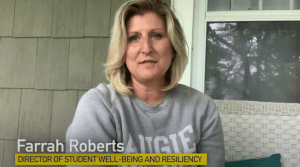
Farrah Roberts made a short video for “Augie Strong” last May to discuss student mental health during the pandemic.
violence on campus,” said Farrah Roberts, who joined Augustana in summer 2019 as the college’s first director of student well-being and resiliency.
“The opportunity to create even more robust educational opportunities for our students could not be passed up,” she said recently. “To go from an application to a hire in one year is an incredible feat and shows the importance of this grant on our campus.
“Like most college campuses, the issue of sexual violence prevention and education is important to staff, students, and faculty. It is important we take the opportunity to educate all members of our community,” Roberts said. “The safety of our students is always our top priority and addressing the issue of sexual violence prevention is critically important.”
Augie has offered many opportunities to provide sexual violence prevention education to students — including mandatory trainings, group trainings, and frequent programming opportunities. The new position allows the college to focus efforts and understand the best way to reach and educate the entire student body consistently, Roberts said.

Zachary Draves, a 29-year-old Rockford native, is the new program director for sexual violence prevention and education at Augustana.
This past December, Draves earned a master’s degree in social work from Aurora University (outside Chicago).
“Zachary brought with him a robust background and set of experiences in addition to an incredible amount of energy and enthusiasm,” Roberts said. “His ability to connect with students and plans for the future were key in his hiring.
“Zachary will work to assemble the Coordinated Community Response Team, which brings in staff and faculty from across campus to address specific tasks outlined in the grant,” she said. “Additionally, work has already begun on involving students from every area on campus to be actively engaged and involved in the ongoing education and prevention programs.”
As a requirement of the grant, Draves must develop and lead a Coordinated Community Response Team of campus and community stakeholders to focus on prevention efforts. And he will ensure that victim services, law enforcement and student conduct experts are involved, too.
According to a 2016 national survey of 25,000 U.S. college and university students, 1 in 5 women and 1 in 14 men experienced sexual assault while in college.
For female bisexual and transgender students, victimization rates were even higher. More than 1 in 4 of transgender students and more than 1 in 3 of bisexual students experienced sexual assault while in college.
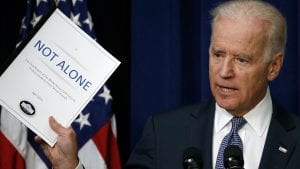
In 2014, then Vice President Joe Biden discussed the release of the first report of the White House Task Force to Protect Students From Sexual Assault.
Of the 2,380 total students who said they experienced rape during college, only 7 percent reported the incident to school authorities, according to the January 2017 report, released by The White House.
In 2014, then-President Obama and Vice President Biden created the White House Task Force to Protect Students from Sexual Assault.
The Task Force was created to:
- Raise awareness of the frequency in which sexual assault occurs at all school levels.
- Let survivors of sexual assault know that they are not alone and that there are resources to help.
- Ensure that colleges and universities across the country know how to develop a comprehensive plan to keep students safe from sexual assault.
- Help schools live up to their obligations under Title IX, which deals with sex discrimination, sexual harassment and assault.
Interest in social justice issues
Draves – who has experience as an athlete, journalist and educator to prevent bullying and violence — majored in political science at Rockford University.
“When I was a kid, I was a lover of American history, which I still am to this day,” he said in a recent interview. He found that a lot of social
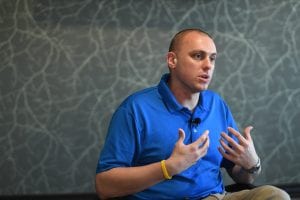
Draves, who has a master’s in social work, started his position in early March.
justice movements over decades, like civil rights and anti-apartheid, have been centered on college campuses, which have been the epicenter for social change.
Draves was involved in many activities at Rockford University, and loved the campus environment. “Being able to mix those two – my passion for college campuses, understanding the history of what campuses have represented, I found that a college campus is my ideal place of work. I feel very fortunate to be here.”
He said the Black Lives Matter movement and other national movements in 2020 intensified his passion for the issues.
“I realized I need to do more, to speak out more and be involved more,” he said. “For me, it all goes back to looking at college campuses and seeing where the action is.”
Draves said the Augie student body is very socially active and wants to see many changes, including how we address campus sexual assault.
While at Aurora, he worked at a number of Chicago-area universities through a domestic violence organization called Pillars Community Health, that offers shelters, and Draves was a prevention educator there.
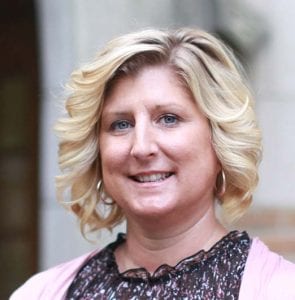
Farrah Roberts joined Augie in summer 2019 as the first director of student well-being and resiliency.
“It was a great opportunity to be able to work with those colleges and work with student athletes, student organizations, with professors, coaches, with many different populations on campus to be able to do this work,” he said.
Pillars was similar to the prevention education that Draves will do at Augustana – speaking with different groups and partnering with other organizations.
“The big difference is, I have more responsibility as far as making sure the work I’m doing is living up to the expectations and requirements that the grant provided,” he said. “It’s very much the same in being able to engage with and partner with different populations on a college campus.”
Sexual assault has been a big problem on campuses nationwide for many years, Draves said.
“One key area I feel needs to be addressed right away is really bridging the gaps between the students and the higher-ups in the university, the administration, as well as faculty and staff,” he said. “If and when something happens on campus, students – rightfully so – demand action. They demand accountability.”
“In recent years, there has been a greater push by students across many different campuses to make sure that universities are doing what they’re supposed to be doing.” Draves said. “There’s a great opportunity here for the students and the administration to really bridge this gap and make sure that students have a say in the decision-making and policy changes.
“It’s about their safety and their well-being,” he said. “I am very intentional about making sure I work closely with students; that students have a seat at the table, that their voices are heard.”
There is a peer education team, with about a half-dozen students so far, and Augie can have up to 16, according to the grant.
“We’re looking to grow the peer education team to make sure that we have more students involved in the process,” Draves said. “When students hear other students talking about this issue, it resonates in a way with them that’s different for them, than if it was a professor or a staff member doing it.”
The grant will not only address sexual assault, but domestic violence, dating violence and stalking.
Draves will focus on preventing incidents from happening in the first place, but will touch on reporting procedures for incidents.
New team to meet monthly
The team he’ll put together includes campus and community stakeholders, to meet regularly to discuss how to strategize and plan how to address the issues. Draves hopes to start meeting in early April, including peer educators and other students.

Augie was among 52 U.S. colleges to get Department of Justice grants to reduce sexual assault, domestic violence, dating violence and stalking on campus.
“It’s going to be a very diverse and inclusive group of stakeholders coming together,” he said, noting they’ll likely meet once a month. The grant will also help compensate peer educators and pay for supplies.
Prevention funds can’t be used during the first year planning phase, but in years two and three the grant can fund training initiatives and materials, guest speakers, peer educators, bystander intervention and resources for the entire campus community.
“The grant really asks that we focus on ways to intrinsically motivate students and actively involve them in this important work,” Roberts said.
“The spirit of young people coming together to effect positive change is where I want to be,” Draves said. “This is a perfect opportunity to be able to understand and come together and realize that campus sexual assault is part of this broader social-justice movement.
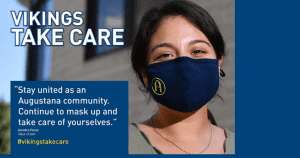
Augustana senior Alondra Perez is part of the “Vikings Take Care” program, promoting Covid safety precautions, part of Augustana Strong — www.augustana.edu/augustana-strong,
“I want to be where young people are, creating change and that is a college campus,” he said. “Augie has a rich history and a rich tradition of doing so. Currently, at the moment, there is a sense of urgency among the students to create changes on campus – particularly around issues of campus sexual assault.”
One priority Draves has is to look at where students are at and how they’re feeling, he said in a college video on the new position.
“It’s a matter of building that trust, building that rapport,” he said. “What I’m hoping to do is a build a bridge between the students and the administration, and to let the students know that we want to work with them. We don’t want to create this distance bet*ween students and the administration. We want to create programs and initiatives that really center the students and also have student involvement.”
After a national search, the college welcomed him to the campus community in early March.
Difference in urgency due to Covid?
Since Augie students have been in a hybrid learning situation (online and in person, distanced more than usual) over the past year due to Covid-19, does that make these issues any less urgent? Draves doesn’t think so.
“Based on what I’ve seen, there’s more of an urgency to talk about it,” Draves said. “Covid has forced all of us to confront and reckon with a whole variety of issues in a way that prior to Covid, we sort of brushed under the rug or didn’t pay that much attention to. That includes sexual assault, domestic violence, dating violence and stalking.

The Augustana Strong Task Force began working in March 2020, with faculty/staff/students across campus who planned for the fall 2020 semester, co-existing with Covid. They continue to meet regularly to provide guidance and leadership on campus.
“When you look at those areas in the context of Covid, when folks were sheltering in place at the beginning of the pandemic, many victims of abuse were confined to the home and their abusers were confined to the home,” he said. “When you look at technology, more folks are on social media than ever before, on the Internet more than ever before – using apps like Zoom. Abusers can use that to keep tabs on victims of abuse.
“If anything, Covid has forced us to confront these issues in a way we never have before,” Draves said. “Covid has kind of allowed for us in the prevention/education business, to get in touch with our creative side, in how we can use technologies to really engage more people than we would have been able to prior to Covid.”
There’s a lot of online bullying and stalking which must be addressed, he said.
“It’s important to remember that sexual violence can occur anywhere at any time, including online,” Roberts agreed. “There is evidence to suggest that incidents actually increase during events like a pandemic. It’s critical that Augustana continues to think of innovative ways to educate students and provide them with resources about domestic violence, dating violence, sexual assault, and stalking.
Research shows that mentally healthy and resilient students have better grades, a higher graduation rate and a better all-around college experience, the college said when Roberts started her job, now overseeing Draves.
“With student success and a positive experience being foundational elements for colleges, it’s important to provide programs and services that support those desired outcomes and with this position, Augustana is committing to that,” Wes Brooks, vice president and dean of student life, said in July 2019. “I’m excited to have Farrah’s experience, ability and passion for the work joining our campus community.”
Roberts was hired to focus on developing, planning, implementing and evaluating programs to address student well-being, including but not limited to resiliency, substance abuse and suicide prevention.
She came to Augustana from Davenport Community School District, where she served as director for the Project AWARE Mental Health program. In that role, she coordinated district-wide initiatives to build mental health awareness, end stigma, and remove barriers for students to use support services.
Draves’ office is in Sorensen Hall, Room 146, and he can be reached at zacharydraves@augustana.edu.









